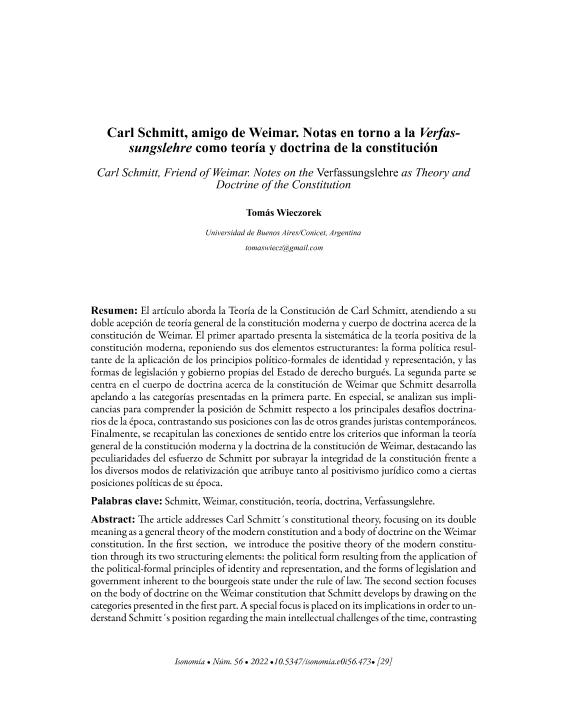Artículo
El artículo aborda la Teoría de la Constitución de Carl Schmitt, atendiendo a su doble acepción de teoría general de la constitución moderna y cuerpo de doctrina acerca de la constitución de Weimar. El primer apartado presenta la sistemática de la teoría positiva de la constitución moderna, reponiendo sus dos elementos estructurantes: la forma política resultante de la aplicación de los principios político-formales de identidad y representación, y las formas de legislación y gobierno propias del Estado de derecho burgués. La segunda parte se centra en el cuerpo de doctrina acerca de la constitución de Weimar que Schmitt desarrolla apelando a las categorías presentadas en la primera parte. En especial, se analizan sus implicancias para comprender la posición de Schmitt respecto a los principales desafíos doctrinarios de la época, contrastando sus posiciones con las de otros grandes juristas contemporáneos. Finalmente, se recapitulan las conexiones de sentido entre los criterios que informan la teoría general de la constitución moderna y la doctrina de la constitución de Weimar, destacando las peculiaridades del esfuerzo de Schmitt por subrayar la integridad de la constitución frente a los diversos modos de relativización que atribuye tanto al positivismo jurídico como a ciertas posiciones políticas de su época. The article addresses Carl Schmitt´s constitutional theory, focusing on its double meaning as a general theory of the modern constitution and a body of doctrine on the Weimar constitution. In the first section, we introduce the positive theory of the modern constitution through its two structuring elements: the political form resulting from the application of the political-formal principles of identity and representation, and the forms of legislation and government inherent to the bourgeois state under the rule of law. The second section focuses on the body of doctrine on the Weimar constitution that Schmitt develops by drawing on the categories presented in the first part. A special focus is placed on its implications in order to understand Schmitt´s position regarding the main intellectual challenges of the time, contrasting his positions with those held by other great contemporary jurists. Finally, the article reviews the connections between the criteria that inform the general theory of the modern constitution and the doctrine of the Weimar constitution, highlighting the peculiarities of Schmitt´s effort to stress the integrity of the constitution against the relativism that he attributes both to legal positivism and to certain political positions of his time.
Carl Schmitt, amigo de Weimar: Notas en torno a la Verfassungslehre como teoría y doctrina de la constitución
Título:
Carl Schmitt, Friend of Weimar: Notes on the Verfassungslehre as Theory and
Doctrine of the Constitution
Fecha de publicación:
06/2022
Editorial:
Instituto Tecnológico Autónomo de México
Revista:
Isonomía
ISSN:
2683-2593
Idioma:
Español
Tipo de recurso:
Artículo publicado
Clasificación temática:
Resumen
Palabras clave:
Schmitt
,
Weimar
,
constitución
,
teoría
,
doctrina
,
Verfassungslehre
Archivos asociados
Licencia
Identificadores
Colecciones
Articulos(SEDE CENTRAL)
Articulos de SEDE CENTRAL
Articulos de SEDE CENTRAL
Citación
Wieczorek, Tomás; Carl Schmitt, amigo de Weimar: Notas en torno a la Verfassungslehre como teoría y doctrina de la constitución; Instituto Tecnológico Autónomo de México; Isonomía; 56; 6-2022; 1-42
Compartir
Altmétricas




